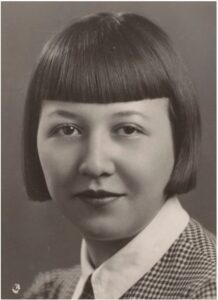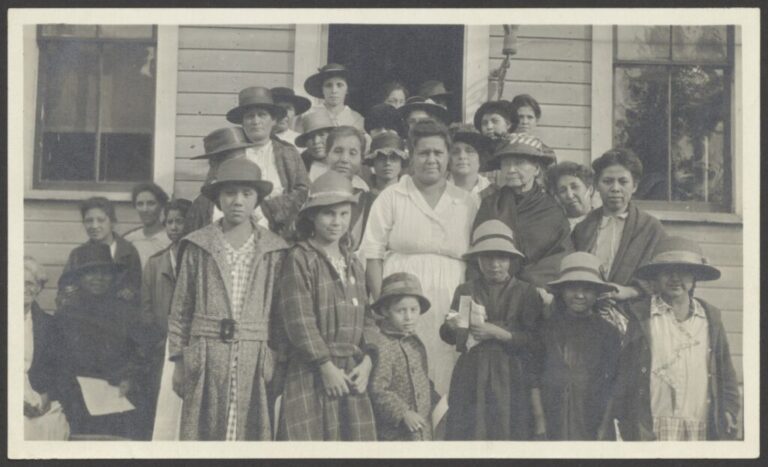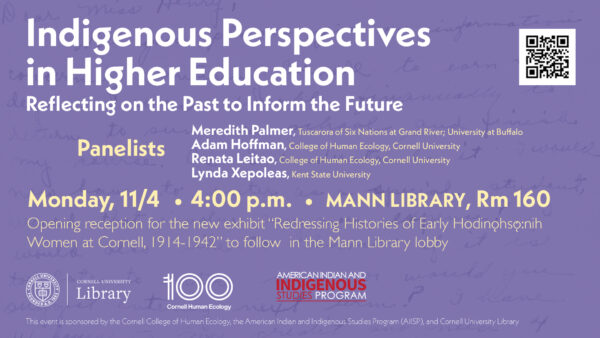Jose Beduya, Cornell University Library
A new exhibit in the lobby of Mann Library highlights the contributions of the first Haudenosaunee women in the College of Human Ecology, who benefited from home economics programs but were constrained by inadequate financial support, cultural stereotypes, and gender bias. Titled “Redressing Histories of Early Hodinǫ̱hsǫ́:nih Women at Cornell, 1914–1942,” the exhibit is part of Human Ecology’s centennial celebrations this year. It opens on Nov. 4 with a panel discussion, “Indigenous Perspectives in Higher Education: Reflecting on the Past to Inform the Future,” at 4 p.m. in Mann Library 160, followed by a reception in the lobby.
“Redressing Histories” features five women from the Haudenosaunee Confederacy—an alliance of six sovereign Indigenous nations—who participated in extension and educational programs in the former College of Home Economics at Cornell (now the College of Human Ecology) between 1914 and 1942.
Among the women featured is Henrietta Guilfoyle (née Hoag), the first Haudenosaunee woman to graduate with a four-year degree from the College of Home Economics in 1940. Guilfoyle will be recognized posthumously as one of the college’s trailblazers during a poster unveiling during the exhibit opening.


Despite the obstacles they faced, the Haudenosaunee women found ways to adapt, said curator Lynda Xepoleas Ph.D. ’23, who previously created an online version of the exhibit.
“These women organized themselves. They developed their own clubs,” said Xepoleas, who is now an assistant professor in the School of Fashion Design and Merchandising at Kent State University. “They found ways that allowed them to interpret and negotiate the types of education or knowledges that were being shared with them by Cornell’s home economists.”
With funding provided by the Graduate Summer Archival Research Fellowship in Human Ecology in 2022, Xepoleas conducted her extensive research on the early Haudenosaunee students by sifting through university records in Cornell University Library’s Rare and Manuscript Collections.
In particular, Xepoleas came across old photographs and hundreds of correspondence by Indigenous students among the papers of Erl Bates, a physician and advisor in Indian Extension in the former New York State College of Agriculture at Cornell University (now the College of Agriculture and Life Sciences) during the early 1900s.
“I went and looked at Erl Bates’s papers, and, yes, they’re his collection, but they also include letters written by Haudenosaunee peoples voicing their own opinions,” she said.
Xepoleas explained that she aims to aims to redress archival erasures and absences by amplifying the voices and lived experiences of historically marginalized and underserved groups like the Haudenosaunee.
“The work that that we’ve done really shows you how instrumental archivists and librarians are in mediating access to collections that allow scholars to research and share more just and diverse histories,” she said.
Human Ecology archivist Eileen Keating supported Xepoleas in her research, and, as a member of the colleges’ centennial planning committee, later invited her to curate the exhibit and moderate the panel discussion.
According to Keating, the work of highlighting Haudenosaunee women of the past will in turn become part of the archives to inform generations of researchers.
“Lynda’s online exhibit, the event poster, and the panel event—which will be filmed—will all be preserved in the University Archives and will be available for future scholarship,” Keating said. “I keep reminding people: You’re making history now.”
“Redressing Histories” is co-sponsored by Cornell University Library, the College of Human Ecology, and the American Indian and Indigenous Studies Program in the College of Agriculture and Life Sciences.
